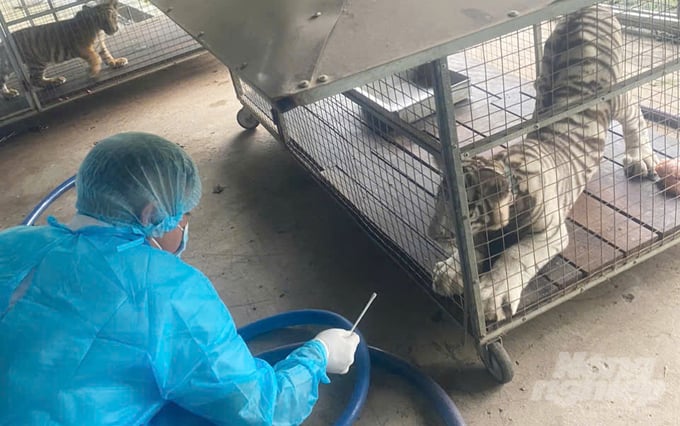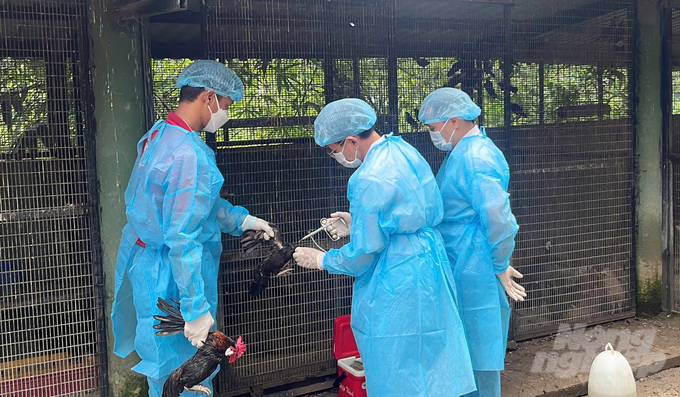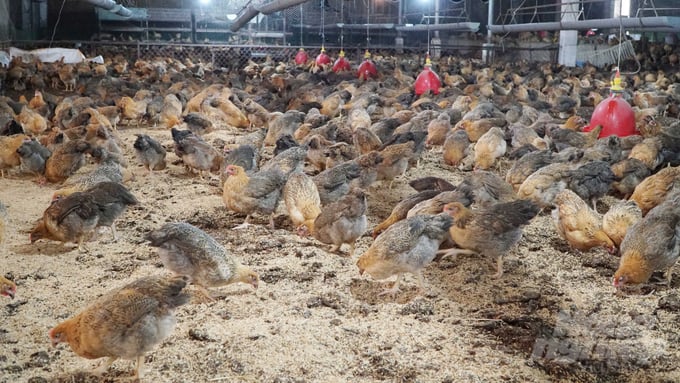May 31, 2025 | 07:05 GMT +7
May 31, 2025 | 07:05 GMT +7
Hotline: 0913.378.918
May 31, 2025 | 07:05 GMT +7
Hotline: 0913.378.918

The veterinary sector is closely monitoring the number of tigers and wild animals at the Mango Garden Ecotourism Area. Photo: Le Binh.
In response to the outbreak of avian influenza A/H5N1 in the locality, Dong Nai People's Committee issues an urgent document on the implementation of measures to prevent avian influenza A/H5N1 in livestock and wild animals.
Director of Dong Nai Department of Agriculture and Rural Development Nguyen Van Thang requests that Mango Garden Ecotourism Area limit visitors to the animal farm until the epidemic is over to prevent the risk of spreading A/H5N1 flu.
On the side of Mango Garden Ecotourism Area Company Limited, since the start of the disease outbreak, the management board and staff have well-implemented the recommendations of experts. The company has temporarily suspended all service activities. Wildlife caretakers are also fully equipped with protective gear to ensure they are not infected with the disease.
According to Luong Hai Phong, Deputy Head of the Disease Prevention Office, Dong Nai Sub-Department of Livestock Production and Animal Health, the province's method is to inspect, trace the source and thoroughly handle the disease at its root, but since 20 tigers and 1 leopard were discarded to stop the spread of A/H5N1 avian influenza, no additional cases of influenza infection have been confirmed.
“Although the most stressful time has passed, no wild animals at the Mango Garden Resort have shown signs of flu or other diseases, but we are still keeping a close watch on them. Upholding the spirit of not being negligent, we and the veterinary staff of the resort will be proactive in responding to any situation that may arise after this serious incident,” Luong Hai Phong said.

Dong Nai People's Committee requires localities to ensure a vaccination rate of over 80% for poultry flocks. Photo: Le Binh.
A working group from the Department of Animal Health recently went to the Mango Garden Ecotourism Area to collect fecal samples from wild animals for testing. The group also collected samples from communes in Trang Bom District, which are adjacent to the area where the A/H5N1 outbreak occurred. This is not only to isolate the disease area and trace the source of the epidemic but also to help Dong Nai's livestock avoid possible bad situations.
The total poultry flock in Dong Nai province is currently estimated at 30 million heads, including chickens, ducks, quails, pigeons, etc. These species are very susceptible to influenza A/H5N1. Nguyen Truong Giang, Head of Dong Nai Sub-Department of Livestock Production and Animal Health, speculates a serious risk of avian influenza in the province.

Having a large poultry population, Dong Nai needs to be more careful to trace and stop the source of the disease, otherwise the consequences will be unmeasurable. Photo: Le Binh.
Since the beginning of the year, the results of avian influenza surveillance at farms from 3,022 samples are all negative, including 1,128 samples for virus detection, 1,865 samples for antibody testing after vaccination, and 29 samples for antibody testing due to natural infection.
At this point in time, Dong Nai has nearly 400 farms certified as safe from avian influenza and Newcastle disease. Through clinical monitoring of the disease situation in the area from October 3, no new cases have been reported in wild animals and poultry.

Concentrated livestock farms and cooperatives in Dong Nai also need to be extremely careful about the health of poultry flocks. Photo: Le Binh.
Not only the functional sectors and specialized agencies are taking drastic measures to prevent bird flu, but cooperatives and people are also joining hands to control the epidemic. Le Van Quyet, Director of Long Thanh Phat High-Tech Agricultural Cooperative, said, “Although the cooperative's farms have complied with regulations on disease prevention, in this context, being a little more careful would not be redundant”.
“When investing in livestock farming, there must be facilities that ensure biosecurity, and breeds must be selected or purchased from reputable establishments that are controlled by the veterinary sector. During the farming process, farmers must report any changes in the herd or any unusual phenomena to the relevant authorities for timely intervention. Farmers must also vaccinate their livestock and poultry thoroughly”.
Translated by Samuel Pham

(VAN) Vaccinating juvenile pangasius helps reduce disease, antibiotic use, and farming costs, increasing profits for export-oriented farmers in An Giang.

(VAN) Due to a limited supply of workforce and competitive recruitment requirements, businesses struggle to retain talented veterinary human resources.

(VAN) WOAH’s guidance aims to mitigate disease risks through a One Health approach that balances economic, conservation, and public health interests.

(VAN) Ms. Nguyen Thi Dung, Deputy Director of Ngoc Hoang Cooperative, shared about the journey of bringing dragon fruit to Europe, achieving annual revenues in the billions of VND.

(VAN) Bamboo products from Thang Tho Bamboo Cooperative have reached many countries around the world, while also creating jobs for local workers.

(VAN) The Management Board of Con Dao National Park reported that a green sea turtle, tagged in the Philippines, has traveled thousands of kilometers to lay 84 eggs on Bay Canh Islet.

(VAN) Green technology is paving a new path for sustainable aquaculture in the Mekong Delta in particular and across the country in general, helping reduce emissions and adapt to climate change.